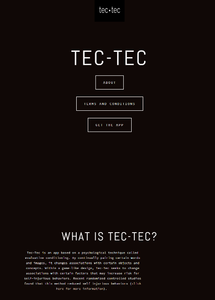TEC-TEC: Therapeutic Evaluative Conditioning

- Description:
TEC-TEC is an app that presents users with paired words/images (such as spider/cut, joy/me, sanddune/compact disc). Users then have to choose these pairs from subsequent grids of pictures/words as quickly as possible. These get more and more difficult as the grid sizes increase and presented options change, and users are awarded points for speed and accuracy. Each session of play is designed to last 1-2 minutes. Each session is unique, allowing the user to replay the game as they wish.
- Service URL:
- http://tectectech.com/
- Agency Responsible:
- Florida State University, Technology and Psychopathology Lab.
- Mobile Platforms:
- Apple and Android.
Details
- Format:
- Smartphone Application. Apple and Android
- Intervention Type:
- Psychological – Exposure based techniques. Pairing of words and images to create aversion to self-injurious behaviours, and increasing liking of "self" related words.
- Course Structure:
- No Set Course.
- Course Length:
- Other.
- Support Option:
- Program guidance.
Target Audience
- Primary Category:
- Suicidal ideation.
- Target Audience:
- Adult.
- Language:
- English.
Access
- Mobile platforms:
- Fee:
- Free.
- Access:
- Open: No registration required.
- Contact Details:
jcfranklin@fsu.edu
Research evidence
- Research Trials:
- 3
- Research RCTs:
- 1
- Outcome Summary:
One randomised controlled trial (Franklin et al 2016, Study 1) has been conducted on the publicly-available version of TEC-TEC. This focused on non-suicidal self-injury. 114 adults with a recent history of self-cutting were randomised participants to either TEC or a control version of the app for 4 weeks, during which time participants were allowed to access the app as much as they wanted. Following the 4-week trial, participants receiving TEC-TEC reported significantly few self-cutting episiodes, and this decreased as a function of dosage. This effect was not maintained beyond immediate post-intervention. Overall non-suicidal self injury, and suicide plans, showed a signficantly greater reduction in the intervention group, but neither were maintained beyond immediate post-intervention. There were no treatment effects on suicidal ideation.
A second RCT (Study 2 of Franklin et al 2016) closely replicated Study 1, but with a few minor alterations - the main being that the unpleasant stimuli were altered to be more disgusting/fear-inducing. Evidence for effectiveness was weaker, and this version of the app is not available to the public.
A third RCT (Study 3 of Franklin et al 2016) has been conducted on an additional variant of the app, incorporating images/words specific to suicide rather than non-suicidal self-injury. Evidence for effectivenss of this version of the app, although slighter stronger than study 2, was weaker than for study 1. Like the version used in Study 2, this version of the app is not available to the public.
- Recommended rating, reviewer 1:

- Recommended rating, reviewer 2:

Read more about Beacon's Smiley Rating System.
Research paper citations
Franklin, J. C., et al. (2016). "A brief mobile app reduces nonsuicidal and suicidal self-injury: Evidence from three randomized controlled trials." J Consult Clin Psychol 84(6): 544-557.
User ratings
User ratings and comments are moderated in order to assure the quality of the submissions. It might take a week for your rating to show up.
Your rating
Login to rate this service.
Other user ratings
No ratings for this service yet.
Last Updated: June 13th 2018

 Home
Home
 Categories
Categories Suicidal ideation
Suicidal ideation